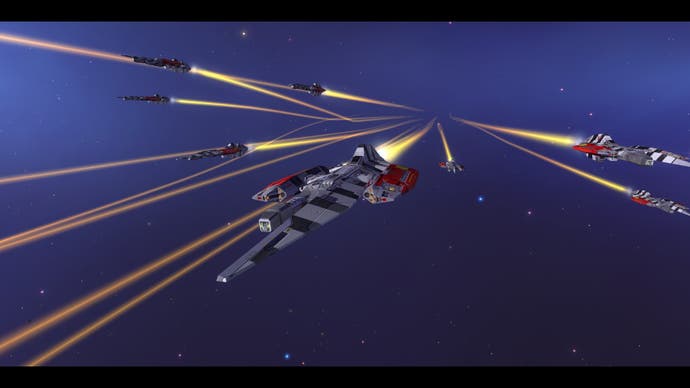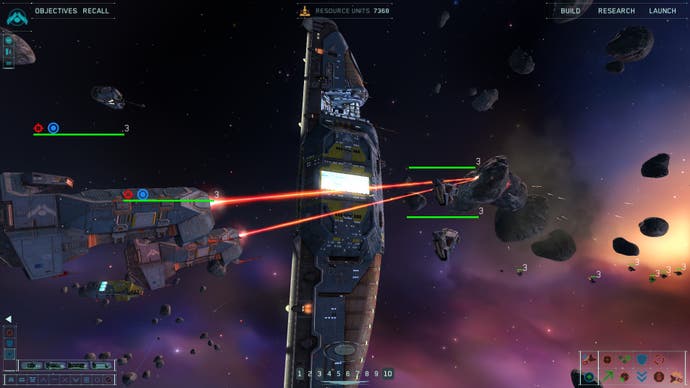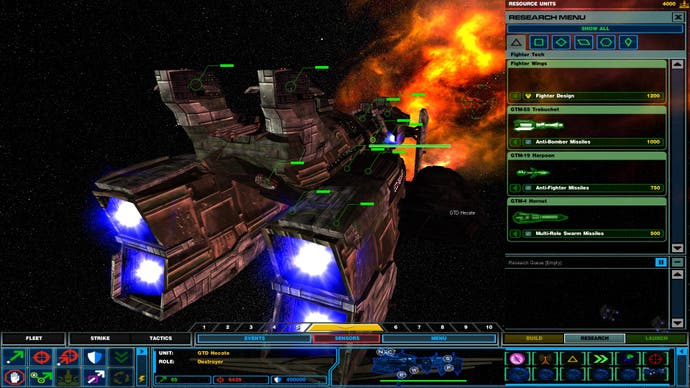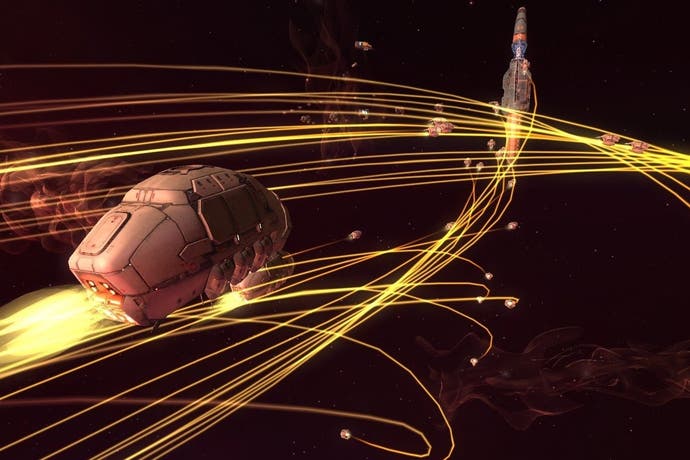Homeworld Remastered review
Polished relics.
What's been so frustrating about the Homeworld games isn't just that a few people never quite got them, it's that for more than a decade no-one has been able to get them at all, period. In spite of the ease with which PC titles have been sold and distributed since Steam first launched (which, incidentally, was in the same week as Homeworld 2), it seems absurd that such a universally acclaimed series has taken this long to reappear. That the games, sans Cataclysm, are at last available in HD form has almost made the wait worthwhile.
Given than an entire generation of gamers has grown up without knowing or experiencing Homeworld, it's perhaps necessary to explain the appeal of the originals, which apart from being perhaps the first games to properly tackle the issues of controlling multiple units in a 3D space, managed to offer up one of the most compelling and satisfying storylines any strategy title had ever managed before - or indeed has managed since. A reimagining of Battlestar Galactica before such a thing was even a glint in Ronald D. Moore's eye, Homeworld follows a civilisation in search of its ancient homeworld, of course while being pursued by a ruthless foe. Without giving too much away for the sequel, it isn't long after the Home Sweet Home signs are nailed above the fireplace that extinction threatens humanity once again.

It's not so much the story itself that remains impressive, but the way it's told. The game offers a stark choice, survival or oblivion, which is made all the more emotive via stark means; brief animated scribbles between missions, laconic voiceovers, and a wonderfully understated musical score - all of which have been reworked and again combine to provide a compelling narrative composition, made all the more remarkable for being almost totally devoid of characters from which to hang any drama. Yet the games remain efficaciously captivating, precisely because extinction is always a hyperspace jump away.
While Relic, the developer of the original games, deserves much of the credit for creating such an absorbing and almost timeless brace of games, it is largely thanks to the resources of Gearbox Software - somewhat ironically given its renown for resurrecting and then trashing beloved game licenses - that this Remastered Collection now exists. Essentially what Gearbox has done, largely via the efforts of a number of old Homeworld devs, is update the ageing and still capable Homeworld 2 engine, so that we get hi-res textures, dynamic lighting and various other pretty things, all wired up to both Homeworld games. Essentially the collection is two acts of a single mega-game, which for those who've never played either is a very good thing. For those with fond and lucid memories however, particularly of the first game, the compromises that have been made often make it seem as if the upgraded engine has rather been wedged into the ageing Homeworld structure a little too forcefully, causing a few nuts and bolts to come loose in the process.

As an example, the tight formations of the original game are very much less effective, with ships often breaking ranks and units quickly losing effectiveness after one or two passes. Unfortunately this means that the choreography that marked out the original game seems a little more chaotic, but perhaps that's the way it should be, it being the nature of warfare and all.
In some areas there is improvement in the crossover, such as with the removal of fuel as a resource, which was a mild annoyance in the first game that was quietly dropped for the sequel. Likewise, whereas as it was usually necessary to laboriously hoover up resources at the end of each mission in the original game, in the sequel, and thus now in both games, whatever resources are left unplundered at the end of one mission are automatically added to your stock for the next. Arguably this makes the campaign somewhat easier than some might be used to, but given how punishing the original game could be, perhaps the adjustment is for the best in these less patient times.
In any case, if you don't like what Gearbox has done with the Remastered versions, you can always play the old games as Relic intended, both of which have been included in the collection and whose only concession to ensure compatibility with modern systems is to have the multiplayer stripped out. In actuality the originals still play and look great and the first Homeworld should at least be sampled in all its pre-millennial glory, if not completed. It's aged far better than any game from 1999 has a right to.

If you want to play another human, you will have to stick to the combined Remastered game, which takes the ships, factions and scenarios of both Homeworld games into one lobby system. Unfortunately the unit balancing thus far leaves a lot to be desired and it's not uncommon to be dumped out of the game entirely, hence why PvP skirmishing is flagged as beta. But at least it works, is generally stable and offers a promising glimpse at the game's long-term future.
Hopefully it's a future that will begin promptly with one or two patches. The game is hardly broken, but between the odd crash bug and a few niggling inconsistencies with the source material, one would hope and expect one or two updates over the coming weeks, just to put some spit on the polish. Beyond that and pulling multiplayer out of beta, what would really complete the collection would be the inclusion of Homeworld: Cataclysm, even if only in it's original unmastered form. We can but dream.
With space battles now more spectacular than even the evergreen Eve Online, and with far less effort required to enjoy them, this sees two excellent games restored. While in a past it was tricky to argue a decisive case for either of the Homeworld games for greatest RTS of all time, now they've been forever merged, updated and supplemented with the original games, the collection is indispensable.

